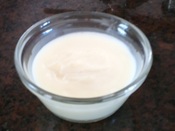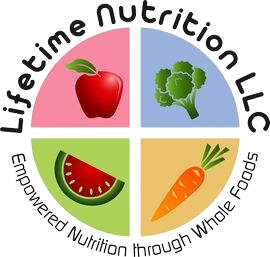 My opinion is you should! Why? Because it is so easy and there are many harmful ingredients in the commercial brands. Some of the natural ones also have questionable ingredients and don't always work. It has been years since I used commercial deodorants. Mainly because of the aluminum, pthalates and parabens in them. But there are plenty of other ingredients to worry about. Studies have indicated that the skin absorbs everything we put on it, so why wouldn't it absorb the ingredients in deodorants? Below are some of the harmful ingredients in commercial deodorants:
Underneath your skin in your armpit area are clusters of lymph nodes which is an essential part of our immune system. Some ingredients like aluminum have come under fire for being a risk factor for breast cancer and alzheimers, although the breast cancer risk is non-conclusive, I err on the side of caution.. So, it's been about ten years (at least) that I have been using natural deodorants. There are so many to choose from, and this is where you can really see bioindividuality clearly. What works for my husband, does not work for me! And I have an added issue, some really irritate! After settling on one that I like and have been using for years even recommending it to people they go and change the ingredients, adding propylene glycol (a preservative, but an endocrine disruptor). Why, I have no idea, there was no issues with preservation. I am down to my last one with original ingredients and have about three others different deodorants in my drawer that I have tried and work decently in cold weather, but not in the summer. In the winter, I was even able to get away with just using coconut oil. I started to try different deodorants, yet again, when my sister inspired me by making her own. She claimed it was really easy and for a busy mother of five, so say it is easy, it has to be! She made me some and it worked better than most store bought but unfortunately my underarms were irritated, too much baking soda for my underarms. Easy fix, less baking soda. My son is now using the deodorant with no problems! I checked online for some recipes, it seems that common ingredients are: Coconut oil Baking Soda or diatomaceous earth (food grade) Arrowroot powder Shea butter Bentonite clay Beeswax or Canuba wax Cocoa butter Vitamin E Essential oils So knowing that coconut oil works ok in the winter, I was definitely using that. I bought shea butter, arrowroot powder and lemon essential oil and I already had the (non aluminum) baking soda, peppermint and tea tree essential oils. The picture up top is the final product :) Some people like stick deodorants in which case you would add one of the waxes or the bentonite clay, but I don't care. This is more like a lotion. I use a spoon to take a little out and keep the deodorant clean. And guess what? It works and it only took about 5 minutes to make! I may have to add a little more baking soda for hubby but this one is great and it smells awesome too! So take a look at recipes online, (they are abundant) and get creative in the kitchen. Source for ingredient list: www.mightynest.com
0 Comments
This is an update to my first post from August of 2012
Most people do not drink enough water but believe that they are. Somewhere along the line we have lost our roots. We have forgotten that we are born from water and need to replenish our supply every day. Water is one of the most important nutrients in our body, and, so often forgotten. Our body is about 75% water and our brain 85%. EVERY cell in our body needs water, we won’t survive without it. So why don’t we drink enough? A common misbelief is that if we drink something we are hydrating. Usually the fluids that are covered in this thinking are coffee, soda, tea, sports drinks etc. These do not hydrate the body! In fact, most contain caffeine which actually stimulates you to release fluids from your body. They also contain sugar…not a great combination. How we lose fluids daily: breathing, caffeinated beverages, alcohol, sweat, urine and feces. This creates a cycle of dehydration, if you are not replenishing. When you become dehydrated your body fluids become concentrated and water is taken out of your cells and they shrink. This concentration of fluids can lead to high blood pressure, increased cholesterol, strokes, edema and many other health conditions. The functions of water: one of the most important functions is to clear toxic wastes from the body. If you are not drinking enough water, the toxins accumulate and can cause inflammation which in turn can cause a disease state. Water is a source of energy, it generates electrical energy inside your cells and helps to either heat or cool your body, it helps prevent DNA damage, it helps to break down food because it is a major solvent in the body, it helps reduce fatigue, it even helps to combat cancer by bringing oxygen into your body. There are so many other beneficial tasks that water does; we should be drinking a minimum of 8-10 cups of water (64-80 oz). That is just to replace what you have lost through your daily metabolic activities like breathing and clearing out cellular debris. If you are outside sweating, you need to be drinking more! In fact, half your body weight is what you are striving for EVERY DAY! How to tell if are dehydrated: Most people believe that dry mouth is a good indicator of dehydration. The fact is that this is one of the last indicators of dehydration and this perception decreases as we age. By this time body fluids are already becoming concentrated and energy production decreases. A better indicator is the color of your urine. A well hydrated person has colorless urine. Other indications of dehydration: fatigue, irritable, anxious, depressed, not sleeping well, cravings, these signs can be masked by the use of medications. If you have children, please keep in mind that because of their rapid growth and cell division they are using up a great deal of water and are naturally dehydrated. They need special attention and you need to ensure that they are drinking enough water to meet their needs. Some signs that your child is not getting enough water: difficulty learning, less alert, decreased attention span and asthma and allergies increase. How do we get enough water?
If your water intake is not sufficient, the body will reuse as much water as possible. The water is reclaimed in the large intestine and motility of the feces becomes slower and you become constipated. Water is lubricating and when you add fiber; increases motility. The best way to combat dehydration is to avoid beverages that dehydrate (mentioned above) and make sure that you drink half your body weight in water each day. Source: You’re Not Sick, You’re Thirsty! Water for Health, for Healing, for Life; F. Batmanghelidj MD |
AuthorKerri Ferraioli Archives
March 2023
Categories |

 RSS Feed
RSS Feed